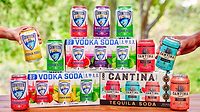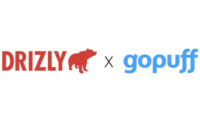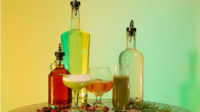Behavioral research platform Veylinx, New York, revealed in a new year-over-year study how consumer demand is increasing for both non-alcohol and alcohol canned cocktails.
Using Veylinx’s proprietary methodology — which measures actual demand rather than intent — the study found that demand for non-alcohol canned cocktails grew by 4%, while demand for alcohol canned cocktails surged by 20% during the last year, the company says.
Although interest remains strong for non-alcohol alternatives, the percentage of people trying to reduce their alcohol consumption fell by 18%, to 38%, according to Veylinx. This decline from 2022 could lead to lower participation in abstinence events like Dry January, it says.
Further, half of respondents claimed they would drink less alcohol if better non-alcohol alternatives were available, showing opportunity for yet more innovation in the beverage sector, the company notes. Those looking to reduce their alcohol consumption are 50% more interested in non-alcohol cocktails, it says.
In 2022, “never tried before,” was the top reason consumers gave for not buying canned non-alcohol beverages, according to the company. That is no longer the case in 2023, suggesting that non-alcohol canned cocktails increased their market penetration during the last year — flavor and price are now the primary reasons people don't buy non-alcohol cocktails, the company says.
“Even with fewer people trying to reduce their alcohol consumption, demand for non-alcoholic canned cocktails continues to grow,” said Veylinx founder and CEO Anouar El Haji, in a statement. “Drinkers and non-drinkers alike are receptive to ready-to-drink alternatives that are better for their health and wallets.”
The study also measured demand for non-alcohol cocktails enhanced with functional benefits like mood boosters, detoxifiers and CBD.
Demand for the standard non-alcohol version increased 14% from last year, while the enhanced variations increased only slightly and the zero-calorie version fell by 1%, according to the study. This suggests consumers might be losing interest in what they perceive as marketing gimmicks, the company says. The CBD version saw a 4% increase in demand, remaining the most popular non-alcoholic variation.
Additional key findings:
• The optimal price for non-alcohol canned cocktails that maximizes revenue for brands is $12 for a four-pack
• 44% of people expressed support for an additional 10% tax on alcohol as a public health measure for reducing consumption
• For those aiming to drink less alcohol by replacing it with other beverages, energy drinks experienced the greatest increase in popularity
• Physical health and cost are the two most popular reasons for reducing alcohol consumption
• A lower price would convince 20% of consumers to buy more non-alcohol cocktails
To download more detailed results from the 2023 Non-Alcoholic Canned Cocktail study visit www.veylinx.com



